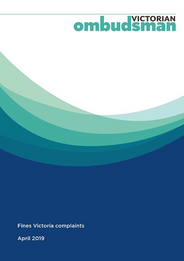Tabling her report on Fines Victoria complaints in the Victorian Parliament today, Ombudsman Deborah Glass said her office had been inundated with complaints about the new fines body since its establishment in late 2017.
Ms Glass said her office received 605 complaints about Fines Victoria in 2018, a 74 per cent increase on the number of complaints received about its predecessor agency, Civic Compliance Victoria.
“Many complaints were about delay in the processing of nominations, completing reviews and implementing payment plans,” Ms Glass said. “Others were about call wait times and difficulties making contact, many by people deeply anxious about the impact of delays.
“The impact of these issues should not be underestimated. People had their licences wrongly suspended, or were treated as liable for substantial fines, when they had committed no offence,” Ms Glass added.
Payment plans by people facing serious financial hardship were not being administered properly. The worry and frustration were then compounded by people’s inability to get through to the agency and have their complaints fairly resolved. They plainly were causing sleepless nights; people told us of frustration, anxiety and sometimes, trauma.
Ms Glass’s report includes 13 case studies such as:
- A father who kept receiving enforcement letters for $7,600 worth of fines incurred by his late son. The father tried to contact Fines Victoria on several occasions to have the fines withdrawn, but he was either put through to an automated service, put on hold, or complaints he made online went unanswered.
- A pensioner from country Victoria who thought he had paid off his infringement via a payment plan but who received a legal letter of demand for $1. To add to his frustration, Fines Victoria’s systems didn’t allow him to pay the $1 fine online or at his local post office.
- A taxi owner and driver who went without wages for a month when his licence was suspended. The taxi was shared amongst three drivers and one of the other drivers admitted to committing the traffic offence. Fines Victoria initially refused to accept the taxi owner’s form nominating the other driver - saying it was received one day past the deadline - only to accept the form, and cancel his suspension, some weeks later. By then, the taxi driver had served a month’s suspension.
Ms Glass said Fines Victoria began operating in late 2017 with only partial IT functionality. In October 2018, the agency said its system would be fully functional by February 2019 – it has since revised this deadline to June 2019. The agency says it has put significant resources into addressing the IT challenges and eliminating backlogs.
“But it’s not good enough. We have pointed out that the issues are not solely caused by IT failures. Some stem from poor communication, inflexible exercise of discretion, or poor handling of complaints,” Ms Glass said. “While these are, sadly, perennial themes in many agencies, if the system is failing it is even more important to get the human element right.”
Ms Glass said she was keeping Fines Victoria under review to see whether further investigation is warranted. “We continue to receive complaints, and it is too early to tell whether any improvements have had an effect,” she said.
Source: Office of the Victorian Ombudsman, Australia

